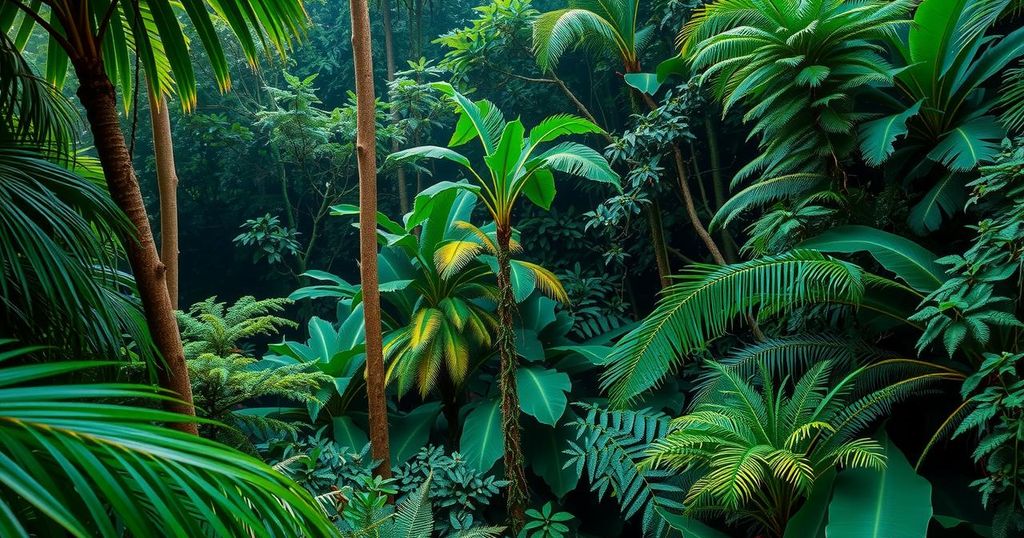Waorani People Fight for Their Rights in Ecuador Amid Global Indigenous Struggles

The Waorani people in Ecuador are challenging government oil rights auctions on their ancestral lands, a case that could reshape global Indigenous consultation practices. Indigenous communities in Taiwan are combating digital misinformation, while a Peruvian leader secured legal rights for a river. In Australia, Indigenous youth gained insights into the aviation industry, and a UN report underscored the need for Indigenous media funding. These diverse struggles highlight the broader fight for Indigenous dignity and rights worldwide.
The Waorani people from Ecuador are actively fighting against a government-led initiative to auction oil rights on their heritage lands, a situation that might redefine how Indigenous communities are consulted globally. After a fleeting interaction with government officials, who spoke only Spanish and failed to engage with local leaders in their native Waotetero, the Waorani have pushed back legally. In 2019, they filed a lawsuit, contending that the government violated their right to free, prior, and informed consultation, a principle rooted in both international and Ecuadorian law.
In that year, 16 Waorani communities sued federal ministries for failing to adhere to these consultation obligations. The critical question remaining is whether genuine consent is needed before any such oil extraction projects can proceed. Pierre Gratton of the Mining Association of Canada noted the consequences, stating, “If you don’t have community support, you pay a price for it.”
The Waorani claimed a significant court victory in 2019 when a provincial court upheld their claims for FPIC rights, and the matter is currently being reviewed by Ecuador’s Constitutional Court for further clarification on these laws. However, as new oil auctions rise, the threat of impact on their lands resurfaces. Waorani leader Luis Enqueri expressed, “We do not want extractivism. We are fighting for the Constitutional Court to say that we alone have the right to decide what happens in our land.”
Switching gears to Taiwan, Indigenous communities grapple with the rise of digital misinformation that threatens to misrepresent their cultures in this age of artificial intelligence. Misleading posts and videos have been proliferating, some falsely alleging Indigenous complicity in historical events while others obscure their cultural identities. The issue of AI-generated content distorts and erases cultural narratives, exacerbating existing issues.
However, there is potential for good. If approached ethically, AI could empower Indigenous voices. For instance, a collaboration in New Zealand is leveraging technology to accurately transcribe Indigenous languages, proving that when communities lead these initiatives, powerful tools for cultural resurgence emerge instead of erasure.
In Peru, Mari Luz Canaquiri Murayari has won the Goldman Environmental Prize for her leading role in securing legal recognition for her community’s river, the Marañón, as a living entity. This acknowledgment allows it to maintain its ecological integrity. Despite a significant legal win for her Kukama people, including plans to safeguard this vital water source, the environment remains at risk from new legislation that restricts NGO litigations against the government.
In Australia, Indigenous students were granted a unique opportunity to explore careers in aviation through a program called Raising Horizons. This initiative aims to connect Indigenous youth with industry role models and expose them to potential career paths within the aviation sector. Daniel Joinbee, a key figure in the program, emphasizes that this exposure is essential for inspiring future Indigenous leaders in aviation.
Recently, at the United Nations, the spotlight turned toward the plight of Indigenous media. Shane Taurima, chair of the World Indigenous Broadcasting Network, highlighted a new UNESCO report stressing the urgent need for support and funding for Indigenous media outlets grappling with severe resource scarcity. The report found that underfunding remains a significant challenge for many of these organizations despite their pivotal role in promoting Indigenous rights.
In summary, the struggle for Indigenous rights encompasses various fronts—from oil extraction in Ecuador, misinformation in Taiwan, environmental justice in Peru, and career opportunities in Australia to media advocacy on the global stage. As communities worldwide continue to confront these interconnected issues, the need for sincere recognition, resource allocation, and respect for Indigenous voices has never been clearer. Their battles do not just resonate in their local territories; they reflect a universal cry for dignity and autonomy in managing their lives and futures.
The fight for Indigenous rights sees varied manifestations across the globe, from the Waorani people’s struggle against oil extraction in Ecuador to the battle against digital misinformation in Taiwan. These stories of resilience highlight the urgent need for awareness and respect for Indigenous perspectives as they navigate their future in the face of adversity. As these communities confront systemic issues, it is essential to amplify their voices and advocate for their rights on a global scale, uniting under the shared belief that no land should be treated as disposable. Their battles remind us all of the inherent value of respecting the Earth and its diverse cultures.
Original Source: ictnews.org







